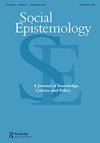为普通信徒道歉:下注信仰与信息环境
IF 2
2区 哲学
Q1 HISTORY & PHILOSOPHY OF SCIENCE
引用次数: 0
摘要
【摘要】有些人相信可以证明是错误的主张——比如2020年大选中存在重大的选民违规行为——然而,持有他们的错误信念可能是明显合理的。我考虑一个我称之为普通信徒的人。在日常生活中,她偶尔会收集一些证据,证明存在重大的选举舞弊假设,但她不会调查此事。此外,她的信息环境是这样的,它偶然地(不是她自己的过错)排除了对存在这种违规行为的论点的反证,并加剧了存在违规行为的信息流动。因此,她确信在2020年美国大选中存在严重的投票违规行为。我认为,虽然她不是探究理性的,因为她没有调查这件事,但她显然是理性的,因为她把自己的信念分配给了证据。虽然她没有权利以克利福德式或武断的方式相信存在这样的违规行为,但她在认识论上也不应该因为坚信这是真的而受到指责。本文的早期版本已在2022年美国哲学进步学会会议上发表。我非常感谢与会者提出的问题和意见。韩俊熙(Junhee Han)协助本文的研究工作,并对早期版本进行了校对,对此我表示感谢。我感谢两位匿名评论者的评论,他们的评论帮助我改进了这篇文章。披露声明作者未报告潜在的利益冲突。在写完这篇文章后,我发现Endre Begby (Citation2021)也讨论了信息环境;我在这里没有篇幅来检查我们的账目是否相符。作者简介:理查德·肯尼斯·阿特金斯理查德·肯尼斯·阿特金斯是波士顿学院哲学副教授。他著有《皮尔斯论推理》(牛津大学2023年版)、《查尔斯·s·皮尔斯现象学》(牛津大学2018年版)、《皮尔斯与生活行为》(剑桥大学2016年版)和《困惑?!》(哈科特2015)。他的文章曾发表在《综合》、《美国哲学协会杂志》、《欧洲哲学杂志》和《英国哲学史杂志》等刊物上。本文章由计算机程序翻译,如有差异,请以英文原文为准。
Apology for an Average Believer: Wagered Belief and Information Environments
ABSTRACTSome persons who believe provably false claims – such as that there were significant voter irregularities in the 2020 election – may nevertheless be evidentially rational for holding their false beliefs. I consider a person I call our average believer. In her daily life, she incidentally gathers evidence favoring the hypothesis that there were significant voter irregularities, but she does not investigate the matter. Her information environment, moreover, is such that it accidentally (through no fault of her own) excludes counterevidence to the thesis that there were such irregularities and intensifies the flow of information that there were irregularities. As a consequence, she becomes convinced that there were significant voting irregularities in the 2020 U.S. election. I argue that while she is not zetetically rational, for she does not investigate the matter, she is evidentially rational in that she apportions her belief to the evidence. While she has no right to the Cliffordian, or assertoric, belief that there were such irregularities, she is not epistemically blameworthy for having the wagered belief it is true.KEYWORDS: Beliefconvictionrationalityevidence AcknowledgmentsAn earlier version of this essay was delivered at the 2022 Society for the Advancement of American Philosophy conference. I am indebted to the attendees for their questions and comments. Junhee Han assisted with research for this article and proofread an earlier version, for which I am grateful. I thank two anonymous reviewers for their comments, which have helped improve this essay.Disclosure StatementNo potential conflict of interest was reported by the author(s).Notes1. After writing this essay, I discovered that Endre Begby (Citation2021) also discusses information environments; I haven’t the space here to examine how well our accounts align.Additional informationNotes on contributorsRichard Kenneth AtkinsRichard Kenneth Atkins is Associate Professor of Philosophy at Boston College. He is author of Peirce on Inference (Oxford 2023), Charles S. Peirce’s Phenomenology (Oxford 2018), Peirce and the Conduct of Life (Cambridge 2016), and Puzzled?! (Hackett 2015). His articles have appeared in Synthese, Journal of the American Philosophical Association, European Journal of Philosophy, and British Journal for the History of Philosophy, among other venues.
求助全文
通过发布文献求助,成功后即可免费获取论文全文。
去求助
来源期刊

Social Epistemology
Multiple-
CiteScore
2.60
自引率
17.60%
发文量
60
期刊介绍:
Social Epistemology provides a forum for philosophical and social scientific enquiry that incorporates the work of scholars from a variety of disciplines who share a concern with the production, assessment and validation of knowledge. The journal covers both empirical research into the origination and transmission of knowledge and normative considerations which arise as such research is implemented, serving as a guide for directing contemporary knowledge enterprises. Social Epistemology publishes "exchanges" which are the collective product of several contributors and take the form of critical syntheses, open peer commentaries interviews, applications, provocations, reviews and responses
 求助内容:
求助内容: 应助结果提醒方式:
应助结果提醒方式:


